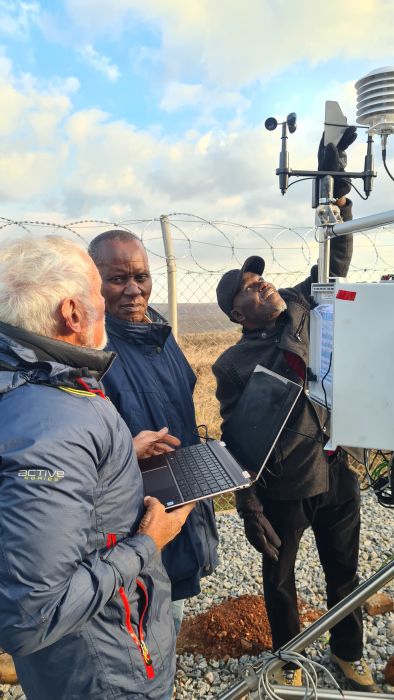







Introduction
At Campbell Scientific, we are committed to providing cutting-edge weather station solutions to organisations around the world. We take great pride in highlighting our partnership with the African Mountain Research Foundation (AMRF) and their transformative impact in safeguarding vital mountain ecosystems and ensuring a sustainable supply of fresh water in the Southern African Development Community (SADC) region.
Background
AMRF was founded by Professor Ralph Clark and Alex Hickman. Registered as a UK charity in June 2021, the foundation's mission is to install scientific equipment in strategic locations across the mountain systems of the SADC region. This equipment generates crucial data to support national and regional mountain conservation and restoration programs, with a focus on preserving the mountain’s ability to provide essential ecosystem services, including acting as water towers and biodiversity havens.
Since its inception, AMRF has successfully raised funds from individuals and businesses in the UK and Southern Africa to support its mission.
AMRF’s Work and Impact
AMRF has set ambitious goals for installing a network of weather stations at elevations above 1,700 m (5,577 ft) on mountains across Zimbabwe, Zambia, Tanzania, Namibia, Mozambique, Malawi, Madagascar, Lesotho, and the Democratic Republic of Congo by 2028. As of 2023, it has already achieved significant milestones, with installations in Zimbabwe and Malawi and plans to expand to Madagascar in 2024.
Two Primary Paths for Making an Impact
AMRF's work is making a significant impact in two areas:
- Protecting Mountain Biodiversity: The Southern African mountain systems have been inadequately studied, leading to a rapid loss of biodiversity. AMRF's network of weather stations helps build a community of mountain science practitioners. By providing location-specific data, AMRF aims to make these mountains a priority for academic scrutiny, ultimately contributing to their preservation.
- Ensuring Fresh Water Supply: The mountains in the SADC region serve as critical water towers for millions of people downstream. AMRF uses data from its weather stations to raise awareness of the value of this ecosystem service and the urgency of conservation efforts.
AMRF collaborates closely with national authorities, local institutions, universities, and non-governmental organizations (NGO) to maximize the impact of its work. These partnerships are crucial for the successful delivery of its programs.
Collecting and Disseminating High-Elevation Data
One of the key contributions of AMRF is its open-access hydrometeorological (hydromet) data, made possible through the deployment of advanced weather monitoring stations from Campbell Scientific. Our durable and research-grade meteorological monitoring stations serve as the backbone of this data-collection initiative. Designed for demanding environments, our stations deliver highly accurate measurements for a wide range of variables. This system not only measures standard meteorological parameters such as air temperature, wind speed, humidity, and rainfall, but it can also calculate various weather-related algorithms. Furthermore, the stations can be tailored to specific needs with customisable options, making the system an indispensable tool for organisations such as AMRF to safeguard mountain ecosystems and ensure water security in Southern Africa.
Campbell Scientific sensors are vital for generating defensible data in environmental research and supporting critical operations dependent on continuous weather monitoring. The data-sharing approach is vital because AMRF is the sole organisation generating high-elevation hydromet data across the SADC region. Without this data, the region's mountains would remain a "data black hole," hindering efforts to understand the impact of climate change and neglecting the region's people, cities, agriculture, and biodiversity.
AMRF's data are already benefiting various organisations, including the Climate Hazards Center (CHC) at UC Santa Barbara, the Meteorological Services Department of Zimbabwe, the Trans-African Hydro-Meteorological Observatory (TAHMO), and the World Meteorological Organization (WMO).
If you would like to access the data for free, please email Clara Hickman at clara@africanmountainresearch.com.
Benefits
AMRF's weather stations in the Southern African mountains offer significant advantages:
- Enhanced Research: Researchers gain vital data for more precise studies on climate, biodiversity, and environmental changes.
- Conservation Support: The data aid in focused conservation efforts, preserving vital ecosystems and water sources.
- Informed Policies: Policymakers can make decisions based on accurate, local data to improve resource management.
- Disaster Prevention: Early threat identification allows proactive measures, preventing ecological disasters.
- International Collaboration: Open data sharing fosters global collaboration and knowledge exchange.
- Capacity Building: Local scientists benefit from data access, fostering expertise in mountain science.
- Public Awareness: Real-time data raise public awareness about the importance of mountain ecosystems and water security.
Conclusion
The data from these weather stations drive research, conservation, policy, and disaster prevention, benefiting the region and fostering international cooperation.
The AMRF-Campbell Scientific partnership exemplifies our commitment to providing innovative weather station solutions that have a lasting impact on conservation and water security in Southern Africa. AMRF's dedication to safeguarding vital mountain ecosystems and ensuring a sustainable water supply aligns perfectly with our mission to provide cutting-edge technology for a brighter, more sustainable future. Together, we are making a difference in the world, one weather station at a time.
Case Study Summary
Application
Safeguarding vital mountain ecosystems and ensuring a sustainable supply of fresh waterLocation
Malawi and Zimbabwe, Southern AfricaProducts Used
MetPRO CR1000X CELL215Participating Organisations
African Mountain Research Foundation (AMRF)Measured Parameters
Air temperature, wind speed and direction, barometric pressure, relative humidity, precipitation, evaporation, solar irradianceView the PDF